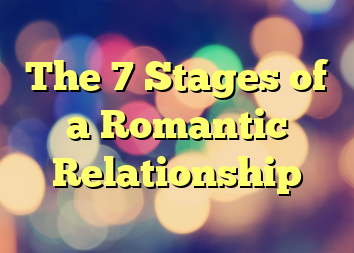The 7 Stages of a Romantic Relationship
There are seven stages in a romantic relationship: avoidance, meeting, dating, breaking up, establishing exclusivity, commitment, and keeping the love you find. Each of these stages vary in length and intensity. At each stage, there are thoughts and feelings telling you what to do and when to do it. You need to learn to listen to your intuition in each stage, so that you can make smart decisions.
It is important to note that the breaking up stage can happen at any time within the other stages; i.e., at any time you or the other person decides to exit the relationship for whatever reason.
In all seven stages, you always have these choices:
1. Continue moving forward
2. Stagnate
3. Slow down or go backwards
4. Exit
By taking notice of the signals from your head and heart, you will be better able to interpret what your intuition is telling you. At each stage, consider, “What am I thinking and feeling?” Are you receiving conflicting messages? Is your head saying one thing and your heart another? This is often the case, particularly in romantic relationships. What happens is there is an agreement error, a contrast between your thoughts and your feelings. This is perfectly normal. Just remember that you have your very own internal system of checks and balances. This system was designed to keep you safe. For the moment, it is temporarily out of order, probably due to stimulation overload. So, before making any decision at this time, go somewhere quiet’ the answers will come with reflection and focus.
Once the answer comes, you should act quickly so you do not have time to doubt your decision. You should never feel trapped or unable to choose what is right for you. If at any time you do feel this way, then that is a good sign that something is not right with the relationship. You then need to examine what it is that is holding you back. If it turns out to be the other person, you are probably better off leaving the relationship.
A smart way to make important stage decisions is to mutually agree on what to do next. After all, “if it is meant to be, it will be,” so you may as well start out making important decisions together. Couples who have good relationships know that it takes time to build their love. They make a conscious effort to progress slowly and purposefully through each stage, enjoying the process, while allowing their love to develop naturally.
Communicating with each other is essential to this process. You should be open and honest about your concerns and fears, so that you can trust that everything has been said and understood by both parties. Even if you find that things aren’t what you would have hoped for, at least you know what is going on and then you can work on making it better.
Levels of Love
Most of us have experienced love blindness. We either think we love someone or do not realize until it is too late that we actually did love someone. You do not have to be blinded by love. You have the power to recognize it, but you must use smart decision-making skills to avoid making fatal relationship mistakes. In this section, work on waking up your awareness so that you will act in “knowing.” The first step is to become familiar with the stages of relationships and the corresponding levels of love that you or your partner will most likely experience.
Relationship Avoidance Stage
“I do not desire love”
Goal: to prepare yourself for love
Characterized by non-interest
Meeting Stage
“I am open to finding love”
Goal: to prospect for the possibility of love in others
Characterized by anticipation
Dating Stage
“I hope to find love”
Goal: to pre-qualify for a potential partner
Characterized by uncertainty
(These three stages represent being single and the importance of using the “Screen-out” process.)
Breaking Up Stage
“I no longer have love with this person”
Goal: to let go of the person/love
Characterized by disappointment/relief
(Breaking up is a transitional stage.)
Exclusivity Stage
“I think this is love”
Goal: to further qualify the person to see if she/he might be a good match
Characterized by excitement
Commitment Stage
“I know this is love”
Goal: to close the deal
Characterized by confidence
Keeping the Love You Find Stage
“I want to keep this love”
Goal: to preserve the love you have found
Characterized by continuous commitment
(These three stages represent being involved and the importance of using the “Screen-in” process.)
The key is to consciously place yourself in each stage. For example, if you decide you want to be in the “dating stage” then be fully present and make a true effort to make yourself available for dating. If, however, you find that your heart isn’t in it, and that you would rather avoid relationships, then you need to stop and consciously put yourself back in that stage. This will help you to stay clear on what you want and enable you to honestly communicate to others “where you are at.” Each level and stage of the relationship is a transition and involves psychological and emotional energy. As you progress through each level, you will no doubt experience excitement and anxiety, hope and fear, arousal and dis-arousal, certainty and uncertainty, along with a myriad of other feelings. You will need to work hard at balancing the messages that you are receiving from both your head and your heart to most accurately interpret the incoming, overwhelming information—it is very easy! to be misled.
***This article is adapted from the book, Get Smart! About Modern Romantic Relationships: Your Personal Guide to Finding Right and Real Love by Michelle L. Casto
